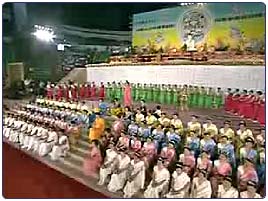Maha Mantra Inaugurates Buddhist Annual Ceremony
By Ekachakra Dasa | Сен 13, 2008

This August 3rd, ISKCON Taiwan’s Bhakti-yoga Cultural Center was invited to sing Hare Krishna at the annual ceremony of the Taiwanese Buddhist organization Huayen World. The event, a fundraiser to support monks and nuns, was staged in the main gymnasium of the Taiwanese rural town Linkou.
Organizers requested the ISKCON singers to inaugurate their “Worship of Heaven and Worship of Buddha Ceremony.” The maha-mantra, they said, would purify the space and the audience’s hearts.
Huayen World also arranged for 108 of their female congregational members to sing on stage with the ISKCON devotees.
The large number of back-up singers were split into several groups for rehearsals. During the first rehearsal session, they sang along in a barely audible manner with their head down, accustomed to strict and grave Buddhist codes of behavior. Yet after learning about the spiritual benefits of the maha-mantra, they began singing loudly. Many shed involuntary tears. “We felt moved, as if being touched by some energy, and were not able to restrain ourselves,” they explained later, while sharing their experience with devotees.
During the performance, the devotees chose a slow melody to suit Buddhist culture’s emphasis on meditation. The audience, an estimated 30,000 laymen and 5,000 Buddhist monks and nuns, enjoyed every minute of it. “Several monks and nuns spontaneously started to chant along with the lead singer, Jahnava dasi,” said a spokesperson for the Bhakti-Yoga Cultural Center. “They weren’t quite in tune, but that didn’t matter – their enthusiasm and respectful attitude outweighted their lack of familiarity with the melody.”
Monks and members of the Buddhist congregation purchased books and CDs at ISKCON’s booth after the performance. They also asked questions about the maha-mantra, wanting to know its meaning, and wondering why the chanting had been such an intense and profound experience for them.
The Venerable Hai Yun, founder of Huayen World, believes that religion is beyond national boundaries and racial distinctions, and commented that since Buddhism originates in India, studying bhakti yoga is like a wife returning to her parent’s home.
All religious denominations express their feelings toward the Absolute Truth in different ways, he said. Adding, “But if others’ way of expressing their feelings for the Truth are better than our own, we should accept them in a modest and open-minded manner.”
The Bhakti Yoga Cultural Center commended Hai Yun for his wisdom. “The bhakti yoga teachings state that the soul is above nationality, race, color and creed, and is an eternal part of the Absolute Truth, Krishna,” said their spokesperson. “So let’s jointly endeavor to spread the Holy Names of God, so that one day the world will experience true unity.”















